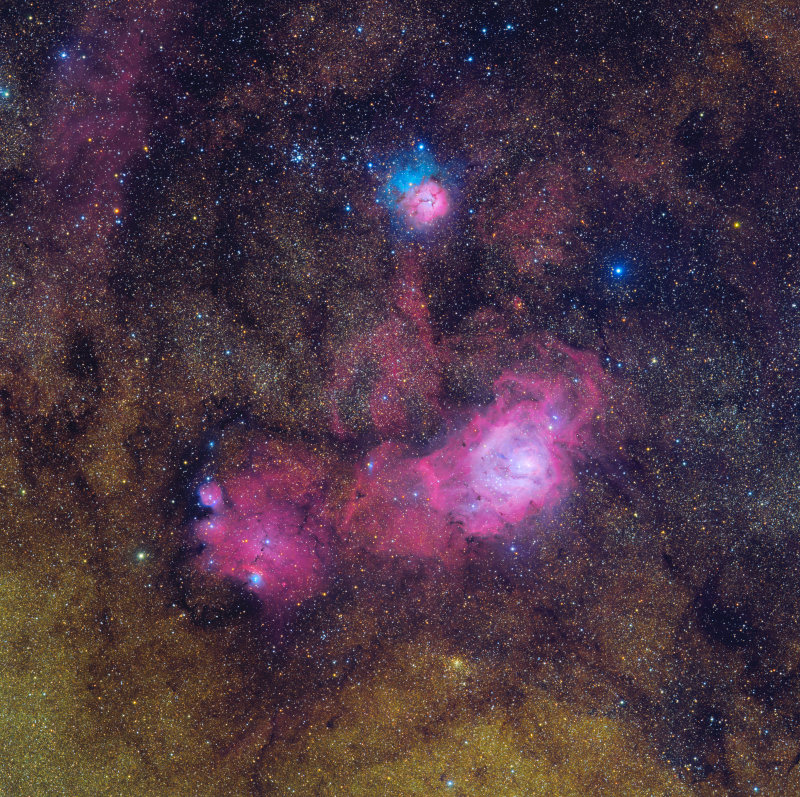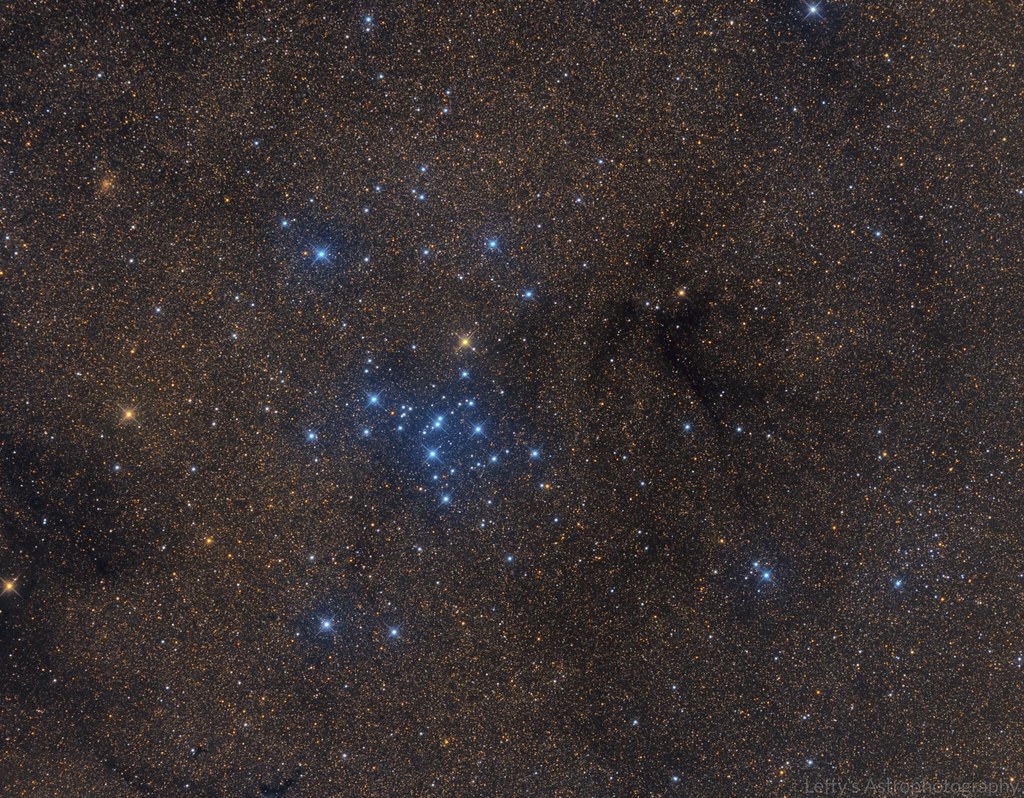Submissions: 2020 August
-
jklovelacephotography
- Asternaut
- Posts: 4
- Joined: Fri Aug 07, 2020 9:58 pm
Re: Submissions: 2020 August
To Robert Nemiroff and Jerry Bonnell,
Hi there. Here's my APOD submission.
Planetary nebula HFG1 (PK 136+05)
Caption
HFG1 is an old, faint, and thus rarely imaged planetary nebula in Cassiopeia. Its most distinctive feature, the blue bowshock, results from this ball of expanding gas bowling through the interstellar medium at between 29 and 59 kilometers per second, leaving behind a trail of gasses. A planetary nebula forms when a sunlike star reaches the advanced age where it first becomes a bloated red giant star, and then throws off the star’s outer shell of gasses when the core collapses to form a white dwarf star. In the case of HFG1, the central white dwarf star V664 Cas is accompanied by a smaller star that is so close it completes each orbit in only about 14 hours. HFG has expanded for approximately 10,000 years, to the point where the nebula is about one lightyear across.
Exposure Information
Telescope: .5 meter Planewave CDK20 telescope
Camera: FLI PL9000 monochrome camera
Location: Sierra Remote Observatories in California
Date: October 18 through November 10 of 2018
Exposure time: 48.5 hours of Hα data (97x 30min subframes), 36 hours of OIII (72x30min), and 5.7 hours combined for RGB (stars only). So total image exposure time is over 90 hours.
Processing: PixInsight and Photoshop
Note: This is a stacked single target image. Only the bad (overscan and alignment overlapped) edges of the frame were cropped out.
Copyright: Jeffrey K Lovelace
Email: info@lerjk.com
Website: www.jklovelacephotography.com
-Jeffrey Lovelace
Hi there. Here's my APOD submission.
Planetary nebula HFG1 (PK 136+05)
Caption
HFG1 is an old, faint, and thus rarely imaged planetary nebula in Cassiopeia. Its most distinctive feature, the blue bowshock, results from this ball of expanding gas bowling through the interstellar medium at between 29 and 59 kilometers per second, leaving behind a trail of gasses. A planetary nebula forms when a sunlike star reaches the advanced age where it first becomes a bloated red giant star, and then throws off the star’s outer shell of gasses when the core collapses to form a white dwarf star. In the case of HFG1, the central white dwarf star V664 Cas is accompanied by a smaller star that is so close it completes each orbit in only about 14 hours. HFG has expanded for approximately 10,000 years, to the point where the nebula is about one lightyear across.
Exposure Information
Telescope: .5 meter Planewave CDK20 telescope
Camera: FLI PL9000 monochrome camera
Location: Sierra Remote Observatories in California
Date: October 18 through November 10 of 2018
Exposure time: 48.5 hours of Hα data (97x 30min subframes), 36 hours of OIII (72x30min), and 5.7 hours combined for RGB (stars only). So total image exposure time is over 90 hours.
Processing: PixInsight and Photoshop
Note: This is a stacked single target image. Only the bad (overscan and alignment overlapped) edges of the frame were cropped out.
Copyright: Jeffrey K Lovelace
Email: info@lerjk.com
Website: www.jklovelacephotography.com
-Jeffrey Lovelace
-
SpookyAstro
- Science Officer
- Posts: 117
- Joined: Sat Feb 07, 2015 7:38 pm
Re: Submissions: 2020 August
 Comet NEOWISE Passing by Globular Clusters M53 and NGC5053 by Transient Astronomer, on Flickr
Comet NEOWISE Passing by Globular Clusters M53 and NGC5053 by Transient Astronomer, on FlickrImage Credit and Copyright Terry Hancock, Tom Masterson, Grand Mesa Observatory www.grandmesaobservatory.com
-
astrosirius
- Science Officer
- Posts: 117
- Joined: Fri Nov 23, 2012 11:17 am
- Location: Barcelona Spain
- Contact:
Re: Submissions: 2020 August
NGC 1022 peculiar galaxy
This peculiar galaxy, beautifully streaked with tendrils of reddish dust, is captured here in wonderful detail by the NASA/ESA Hubble Space Telescope. The galaxy is known as NGC 1022, and is officially classified as a barred spiral galaxy. You can just about make out the bar of stars in the centre of the galaxy in this image, with swirling arms emerging from its ends. This bar is much less prominent than in some of the galaxy’s barred cousins and gives the galaxy a rather squat appearance; but the lanes of dust that swirl throughout its disc ensure it is no less beautiful. Hubble observed this image as part of a study into one of the Universe’s most notorious residents: black holes. These are fundamental components of galaxies, and are thought to lurk at the hearts of many — if not all — spirals. In fact, they may have quite a large influence over their cosmic homes. Studies suggest that the mass of the black hole sitting at a galaxy’s centre is linked with the larger-scale properties of the galaxy itself.
Data & Credit: ESA/Hubble & NASA
Processing by: Lluís Romero
This peculiar galaxy, beautifully streaked with tendrils of reddish dust, is captured here in wonderful detail by the NASA/ESA Hubble Space Telescope. The galaxy is known as NGC 1022, and is officially classified as a barred spiral galaxy. You can just about make out the bar of stars in the centre of the galaxy in this image, with swirling arms emerging from its ends. This bar is much less prominent than in some of the galaxy’s barred cousins and gives the galaxy a rather squat appearance; but the lanes of dust that swirl throughout its disc ensure it is no less beautiful. Hubble observed this image as part of a study into one of the Universe’s most notorious residents: black holes. These are fundamental components of galaxies, and are thought to lurk at the hearts of many — if not all — spirals. In fact, they may have quite a large influence over their cosmic homes. Studies suggest that the mass of the black hole sitting at a galaxy’s centre is linked with the larger-scale properties of the galaxy itself.
Data & Credit: ESA/Hubble & NASA
Processing by: Lluís Romero
Lluís Romero Ventura
http://astrotolva.com/
http://astrotolva.com/
Re: Submissions: 2020 August
The Great Rift
http://www.woodlandsobservatory.com
Copyright: Alistair Symon This image shows the full extent of the Great Rift through Cygnus to the Elephant Trunk nebula in the bottom left. The Great Rift appears as a dark band through the colorful nebulae visible in our Milky Way Galaxy and is a caused by vast areas of dust that are obscuring light from the objects behind. This is a 31 image mosaic taken with a 35mm CCD camera at two different focal lengths (85mm and 530mm). 258 hours of light was collected through H-alpha, SII and OIII filters. There is a much higher resolution version of the image on my website at the address below and you can click on areas of the picture to look at some of the nebulae visible in even greater resolution.
http://www.woodlandsobservatory.com/Cyg ... ft2020.htm
http://www.woodlandsobservatory.com
Copyright: Alistair Symon This image shows the full extent of the Great Rift through Cygnus to the Elephant Trunk nebula in the bottom left. The Great Rift appears as a dark band through the colorful nebulae visible in our Milky Way Galaxy and is a caused by vast areas of dust that are obscuring light from the objects behind. This is a 31 image mosaic taken with a 35mm CCD camera at two different focal lengths (85mm and 530mm). 258 hours of light was collected through H-alpha, SII and OIII filters. There is a much higher resolution version of the image on my website at the address below and you can click on areas of the picture to look at some of the nebulae visible in even greater resolution.
http://www.woodlandsobservatory.com/Cyg ... ft2020.htm
-
strongmanmike
Sagittarius Trio
A classic grouping of bright nebulae in Sagittarius made up of the famous Lagoon Nebula (M8), the Trifid Nebula (M20) and the slightly fainter but no less beautiful, NGC 6559/IC1274 group, along with some threads of faint emission nebula spread around here and there. The golden star fields of the Milky Way complete the scene.
This is an LHaOIIIRGB broadband+narrowband hybrid image, processed as a true colour image
The full size full frame version is here: https://pbase.com/strongmanmike2002/ima ... 8/original
https://live.staticflickr.com/65535/501 ... a857_b.jpg
Copyright: Michael Sidonio
This is an LHaOIIIRGB broadband+narrowband hybrid image, processed as a true colour image
The full size full frame version is here: https://pbase.com/strongmanmike2002/ima ... 8/original
https://live.staticflickr.com/65535/501 ... a857_b.jpg
Copyright: Michael Sidonio
Last edited by bystander on Sun Aug 09, 2020 4:53 am, edited 1 time in total.
Reason: Please no hot links to images > 500 kb. Substituted smaller image.
Reason: Please no hot links to images > 500 kb. Substituted smaller image.
Crescent Nebula (NGC 6888) in HST palette
Full Resolution:
http://www.astrobogdan.pl/wp/wp-content ... c2_SHO.jpg
TEC140 f/5.2 QHY695A,Paramount MyT
Exposure: 34.5h Ha 43x1200s SII 22x1800s OIII 28x1200s, binx1
Date and place: 08.2020 Observatory E-EyE, Fregenal de la Sierra, Spain
www.astrobogdan.pl
Bogdan Jarzyna
http://www.astrobogdan.pl/wp/wp-content ... c2_SHO.jpg
TEC140 f/5.2 QHY695A,Paramount MyT
Exposure: 34.5h Ha 43x1200s SII 22x1800s OIII 28x1200s, binx1
Date and place: 08.2020 Observatory E-EyE, Fregenal de la Sierra, Spain
www.astrobogdan.pl
Bogdan Jarzyna
-
barretosmed
- Science Officer
- Posts: 482
- Joined: Thu Oct 12, 2017 6:04 pm
Re: Submissions: 2020 August
Spiral Galaxy M33 - The Triangulum Galaxy
I kindly ask friends to access the link on the computer, for better details: https://www.astrobin.com/full/f6rvyw/0/
Object photographed below 30 degrees
Equipment:
Apo ESPRIT 150mm
zWO asi 6200mc
51 x 300 seg
Cem60 mount
July 21-24, 2020
Munhoz- MG- Brazil
Processing and capture:
Software: Pixinsight , Adobe Photoshop, Sequence generation pro, PHD, Polemaster, SharpCap
Copyright: Fernando Oliveira de Menezes
Email: Barretosmed@hotmail.com
I kindly ask friends to access the link on the computer, for better details: https://www.astrobin.com/full/f6rvyw/0/
Object photographed below 30 degrees
Equipment:
Apo ESPRIT 150mm
zWO asi 6200mc
51 x 300 seg
Cem60 mount
July 21-24, 2020
Munhoz- MG- Brazil
Processing and capture:
Software: Pixinsight , Adobe Photoshop, Sequence generation pro, PHD, Polemaster, SharpCap
Copyright: Fernando Oliveira de Menezes
Email: Barretosmed@hotmail.com
Re: Submissions: 2020 August
Comet Neowise with M53 and NGC5053
10x90 sec 1600 ISO
Canon 60Da
Takahashi 85
NEQ6-Pro
Nufenenpass (CH)
Full res: https://www.astrobin.com/iaq82h/0/?nc=user
10x90 sec 1600 ISO
Canon 60Da
Takahashi 85
NEQ6-Pro
Nufenenpass (CH)
Full res: https://www.astrobin.com/iaq82h/0/?nc=user
-
andreigusan
- Ensign
- Posts: 10
- Joined: Sun Jul 05, 2020 7:56 pm
Re: Submissions: 2020 August
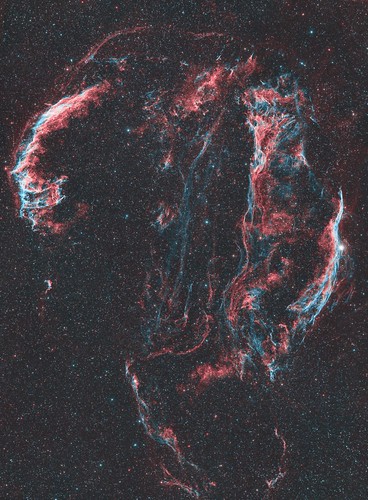
Cygnus Loop - A Stellar Death
More than ten thousand years ago a new light would have suddenly have appeared in the night sky announcing one of the most violent cosmic event: death explosion of a massive star, also known as supernova. For a week or so the supernova outshined all of the other stars in our galaxy. Then it quickly faded away and all that was left was a tiny, dense object – a neutron star or a black hole (we don't know yet) surrounded by an expanding cloud of very hot ionized gas and dust. The elements made inside the supergiant (such as oxygen, carbon and iron) are scattered through space. This stardust eventually makes other stars, planets and possibly life, just like you and me. Yes! We, and everything you see around you, are all made of star dust!
This cosmic ghost picture was taken from my backyard during several short summer nights with a wide field lens and a dedicated mono astro-camera used with special narrow band filters. I needed more than 16 hours total exposure and few more hours of post processing to capture all those fine human-eye invisible tiny details.
The object is known as The Veil Nebula and it's located in the constellation Cygnus. The remnants have since expanded to cover an area of the sky roughly 3 degrees in diameter (about 6 times the diameter of the full Moon). Recent direct astrometric measurements concluded that it's located at 2400 light-years away from our planet.
Gear used:
RedCat51 f/4.9
Camera: ASI1600MM Pro mono
Mount: HEQ5
+11 hours Ha 6nm Astronomik (169 x 4 min)
~6 hours O 6nm Astronomik (88 x 4 min)
Data acquisition from my backyard with SGP over several nights from June, July and August 2020. Calibration and integration with PixInsight. Post processed with PixInsight, Photoshop and Lightroom.
High resolution image and technical details: https://www.astrobin.com/r3h5ll/
-
nick.astrophotography
- Asternaut
- Posts: 4
- Joined: Sat Apr 11, 2020 3:02 am
Re: Submissions: 2020 August
 M78 by Nicolas Tabbush, en Flickr
M78 by Nicolas Tabbush, en FlickrM78
Location: Barreal, San Juan. Argentina.
Date: January 8th. 2019.
Telescope: Vixen Newtonian 200/800mm + coma corrector (0.95 x).
Mount: Losmandy G11 + PoleMaster.
Nikon D810
ISO 800.
10 x 900" Lights
21 Darks
20 Flats.
23 Bias.
Autoguiding: ZWO 60/280 + QHY 5L + PHD2.
Dithering.
Processed in Pixinsight + PS.
Nicolas Tabbush.
Re: Submissions: 2020 August
Here's lookin at you kid
www.ancientstarlight.com
Copyright: Drew Sullivan Jupiter Aug 10, 2020 0450 UTC (sort of)
Ever think you are spending too much time processing images?
www.ancientstarlight.com
Copyright: Drew Sullivan Jupiter Aug 10, 2020 0450 UTC (sort of)
Ever think you are spending too much time processing images?
Re: Submissions: 2020 August
You didn't spend too much time on this image, I think. Even before I saw the "eyes", I thought Jupiter looked very different and "creepy". The evil eye, I thought about the Great Red Spot - that is, until I really saw his "eyes"!Drewster wrote: ↑Tue Aug 11, 2020 2:35 am Here's lookin at you kid
www.ancientstarlight.com
Copyright: Drew Sullivan Jupiter Aug 10, 2020 0450 UTC (sort of)
Ever think you are spending too much time processing images?
Ann
Color Commentator
Re: Submissions: 2020 August
Elephant Trunk Nebula
www.KinchAstro.com
www.KinchAstro.com
-
Lefty's Astrophotography
- Ensign
- Posts: 21
- Joined: Mon Mar 16, 2020 12:32 am
Re: Submissions: 2020 August
My photo of Pickering's Triangle:
This is 17 hours 40 mins of HOO exposure from my Bortle 6 driveway. Captured using a 6" f/4 newtonian, ASI1600, and Astrodon filters on an Orion Sirius mount. Direct link to the full 39MP image: https://live.staticflickr.com/65535/501 ... ed2b_o.png
This is 17 hours 40 mins of HOO exposure from my Bortle 6 driveway. Captured using a 6" f/4 newtonian, ASI1600, and Astrodon filters on an Orion Sirius mount. Direct link to the full 39MP image: https://live.staticflickr.com/65535/501 ... ed2b_o.png
-
Lefty's Astrophotography
- Ensign
- Posts: 21
- Joined: Mon Mar 16, 2020 12:32 am
Re: Submissions: 2020 August
My photo of Ptolemy's Cluster (Messier 7):
This is 24.5 mins of LRGB exposure from a Bortle 4 beach. Glad with how well it turned out for such little integration time. Captured using a 6" f/4 newtonian, ASI1600, and Astronomik filters on an Orion Sirius mount. Direct link to the full size image: https://live.staticflickr.com/65535/500 ... 4f49_o.png
This is 24.5 mins of LRGB exposure from a Bortle 4 beach. Glad with how well it turned out for such little integration time. Captured using a 6" f/4 newtonian, ASI1600, and Astronomik filters on an Orion Sirius mount. Direct link to the full size image: https://live.staticflickr.com/65535/500 ... 4f49_o.png
Re: Submissions: 2020 August
Corona Australis Nebulas and Globular Cluster NGC 6723

by Remidone, su Flickr
Copyright: Moretti Luca

by Remidone, su Flickr
Copyright: Moretti Luca
Re: Submissions: 2020 August
Two comets encounter
Comet C/2017T2 (PANSTARRS) in the tail of C/2020F3 (NEOWISE)
Copyright: Velimir Popov, Emil Ivanov Irida Observatory More info and hi-res images on website
Comet C/2017T2 (PANSTARRS) in the tail of C/2020F3 (NEOWISE)
Copyright: Velimir Popov, Emil Ivanov Irida Observatory More info and hi-res images on website
Re: Submissions: 2020 August
Cometary Globule CG12 & NGC 5367
Copyrights
Data acquisition: Martin PUGH
Processing: Nicolas ROLLAND
Location: El Sauce Observatory, Rio Hurtado, Chile
Dates of Capture July & August 2020
Total integration time of 23 hours (1200sec exposures)
Optics: Planewave 17“ CDK @ F6.8
Mount: Paramount ME
CCD: SBIG STXL-11002 (AOX)
Pre Processing: CCDstack & Pixinsight
Post Processing: Photoshop CC
Full version: https://www.astrobin.com/o611ix/
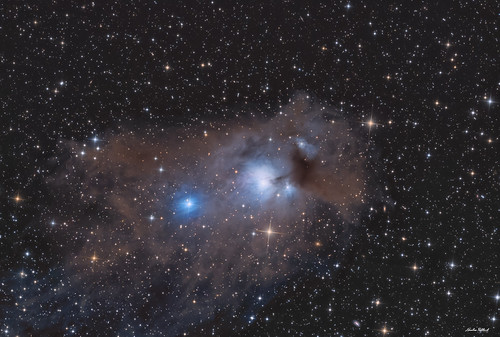
Cometary Globule CG12 & NGC 5367 by Nicolas Rolland, sur Flickr
Copyrights
Data acquisition: Martin PUGH
Processing: Nicolas ROLLAND
Location: El Sauce Observatory, Rio Hurtado, Chile
Dates of Capture July & August 2020
Total integration time of 23 hours (1200sec exposures)
Optics: Planewave 17“ CDK @ F6.8
Mount: Paramount ME
CCD: SBIG STXL-11002 (AOX)
Pre Processing: CCDstack & Pixinsight
Post Processing: Photoshop CC
Full version: https://www.astrobin.com/o611ix/

Cometary Globule CG12 & NGC 5367 by Nicolas Rolland, sur Flickr
Re: Submissions: 2020 August
I wanted to share my recent photo of Mars.

This was taken on 8-9-20 around 3am, when mars was at 40 degrees altitude at my location, along with a bit of lucky seeing.
Copyrights:
Data acquisition/processing: Mark Murrin , Instagram
Location: Lower Burrell, PA - NexDome (The Orion Observatory)
Single Shot: 360sec
Gain: 375
Skies: Bortle 5
Filter: Zwo Ir-Cut
F20 (Celestron 2x barlow)
ADC
ASI224MC
Celestron EdgeHD 11"
Mount CEM120
As3 (best 16 percent of 59,853 frames) + Registax v6 + Photoshop Tweak

This was taken on 8-9-20 around 3am, when mars was at 40 degrees altitude at my location, along with a bit of lucky seeing.
Copyrights:
Data acquisition/processing: Mark Murrin , Instagram
Location: Lower Burrell, PA - NexDome (The Orion Observatory)
Single Shot: 360sec
Gain: 375
Skies: Bortle 5
Filter: Zwo Ir-Cut
F20 (Celestron 2x barlow)
ADC
ASI224MC
Celestron EdgeHD 11"
Mount CEM120
As3 (best 16 percent of 59,853 frames) + Registax v6 + Photoshop Tweak
Re: Submissions: 2020 August
Perseid from early morning 12th August 2020 from Baltimore County Cork Ireland.
The Moon was 7 degrees above the horizon and lighting up the foreground, but the Meteor was bright enough to shine through.
It left a trail that lasted for a minute or more.
Single 60s exp, 14mm, ISO 3200, F/2.8 static tripod.
Thanks Tom
www.astrophotography.ie
The Moon was 7 degrees above the horizon and lighting up the foreground, but the Meteor was bright enough to shine through.
It left a trail that lasted for a minute or more.
Single 60s exp, 14mm, ISO 3200, F/2.8 static tripod.
Thanks Tom
www.astrophotography.ie
-
a.carrozzi
- Ensign
- Posts: 62
- Joined: Tue Aug 25, 2015 9:58 am
Re: Submissions: 2020 August
The Milky Way from Pietrafagnana
Pietrafagnana is a place, in central Italy near Pietrarubbia, where conglomerate rocks can be found. It is known since ancient times and during the middle ages it was considered to be the access port to the hell. Just above the tip of the rocks two bright planets are visible: Jupiter (on the right) and Saturn (on the left)
Canon EOS 6D with Samyang 14mm f/2.8 and SkyWatcher Staradventurer
7x60s f/4 6400 ISO + 90s f/4 6400 ISO untracked for the landscape
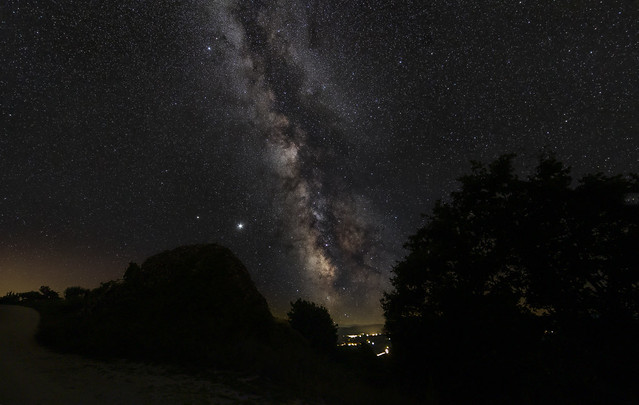 Milky Way from Pietrafagnana by Alessandro Carrozzi, su Flickr
Milky Way from Pietrafagnana by Alessandro Carrozzi, su Flickr
Pietrafagnana is a place, in central Italy near Pietrarubbia, where conglomerate rocks can be found. It is known since ancient times and during the middle ages it was considered to be the access port to the hell. Just above the tip of the rocks two bright planets are visible: Jupiter (on the right) and Saturn (on the left)
Canon EOS 6D with Samyang 14mm f/2.8 and SkyWatcher Staradventurer
7x60s f/4 6400 ISO + 90s f/4 6400 ISO untracked for the landscape
 Milky Way from Pietrafagnana by Alessandro Carrozzi, su Flickr
Milky Way from Pietrafagnana by Alessandro Carrozzi, su Flickr- Robin_Onderka
- Ensign
- Posts: 47
- Joined: Sat Mar 07, 2020 6:54 pm
Re: Submissions: 2020 August
Perseids 2020 from Czech Republic (stacked, pano, composited meteors)
—
Credits: Robin Onderka | www.instagram.com/robin_onderka
Full res: https://flic.kr/p/2jw4zFk
—
3 days, 2 cameras with 2 lenses, over 700 photos, hours of shooting, selecting and editing. This photo is a record of this year's Perseid meteor shower, as I was able to capture from eastern Czech Republic. For the technique, each day I went to a place one hour from my home and shot the sky on 2 DSLR’s. Because I was very limited with a region of the sky I could capture, I collected 28 complete meteors around this north-east part of the sky. Interestingly, most of these meteors flew towards Messier 31, Galaxy in Andromeda.
First camera was a Canon 6D Mark II with Samyang 14 mm f/2.8, which photographed primarily a wide shot of the sky to collect meteors. Second camera was my astro-modified Canon 6D with Sigma 35 mm f/1.4, that was used to photograph this scene (and a few other experiments that unfortunately did not work out).
As for post-processing, all panels were stacked and stitched into vertical panorama. Each meteor was then placed at exact place to match correctly with my panorama, using basic transform techniques in Photoshop. A little game with layer blending mode was also on point.
—
Sky + ground: a panorama made of 6 horizontal panels at 35 mm (modified 6D)
15 x 10 sec - f/2.2 - ISO 6400 per panel
Meteors: wide angle capture at 14 mm (stock 6DmkII)
700+ x 30 sec - f/2.8 ISO 10 000 || a selection of 28 meteors
—
Date and time: 10. - 12. Aug at night time
Location: Staré Hamry; Czech Republic (49°29'18.9"N 18°29'25.4”E)
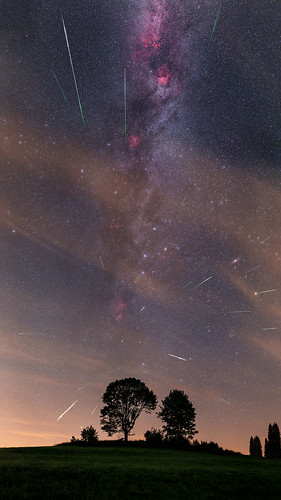 Perseids 2020 from Czech Republic by Robin Onderka, on Flickr
Perseids 2020 from Czech Republic by Robin Onderka, on Flickr
—
Credits: Robin Onderka | www.instagram.com/robin_onderka
Full res: https://flic.kr/p/2jw4zFk
—
3 days, 2 cameras with 2 lenses, over 700 photos, hours of shooting, selecting and editing. This photo is a record of this year's Perseid meteor shower, as I was able to capture from eastern Czech Republic. For the technique, each day I went to a place one hour from my home and shot the sky on 2 DSLR’s. Because I was very limited with a region of the sky I could capture, I collected 28 complete meteors around this north-east part of the sky. Interestingly, most of these meteors flew towards Messier 31, Galaxy in Andromeda.
First camera was a Canon 6D Mark II with Samyang 14 mm f/2.8, which photographed primarily a wide shot of the sky to collect meteors. Second camera was my astro-modified Canon 6D with Sigma 35 mm f/1.4, that was used to photograph this scene (and a few other experiments that unfortunately did not work out).
As for post-processing, all panels were stacked and stitched into vertical panorama. Each meteor was then placed at exact place to match correctly with my panorama, using basic transform techniques in Photoshop. A little game with layer blending mode was also on point.
—
Sky + ground: a panorama made of 6 horizontal panels at 35 mm (modified 6D)
15 x 10 sec - f/2.2 - ISO 6400 per panel
Meteors: wide angle capture at 14 mm (stock 6DmkII)
700+ x 30 sec - f/2.8 ISO 10 000 || a selection of 28 meteors
—
Date and time: 10. - 12. Aug at night time
Location: Staré Hamry; Czech Republic (49°29'18.9"N 18°29'25.4”E)
 Perseids 2020 from Czech Republic by Robin Onderka, on Flickr
Perseids 2020 from Czech Republic by Robin Onderka, on Flickr-
masahiro miyasaka
- Ensign
- Posts: 39
- Joined: Fri Dec 31, 2010 12:37 pm
- Contact:
-
Jeremy Perez
- Asternaut
- Posts: 5
- Joined: Mon Oct 04, 2010 5:15 pm
Re: Submissions: 2020 August
Between clouds, smoke and memories of epic meteor showers past, it sounds like this year's Perseids were disappointing for many observers. I'm grateful for the clear skies we had in northern Arizona, because I was loving it. The quarter moon didn't impact the view too badly and I counted 138 meteors from 12-5AM under Bortle class 2 skies (before moonrise). High altitude at 2250m/7400ft probably helped reduce scattering of moonlight, and the shower was also approaching its peak the same time as the moon was getting higher which may also have helped balance things out.
The submitted image is a composite showing 101 Perseids and 22 sporadics selected from over 3,700 exposures on the night of 11/12 August 2020. Images were captured between 11:10PM and 4:40AM MST/0610-1140 GMT.
The image/star field chosen as the background was based on the shot that contains the bright fireball above and to the right of the San Francisco Peaks. All other meteors were carefully de-rotated, re-aligned and tone/color corrected to this base star field to show the abundance of Perseids tracing to their radiant and to show which meteors were sporadic or part of another ongoing shower.
Image information:
• Canon 6D Mark II
• Tokina AT-X 16-28 f/2.8 PRO FX lens at 16mm
• Base starfield: 4 sec x 15, f/2.8, ISO 12,800, stacked/aligned/processed with Starry Landscape Stacker, Adobe Photoshop and Lightroom to improve signal to noise ratio
• Composited/stacked meteors: 6 sec (before moonrise) to 4 sec (after moonrise) x 100+ images, f/2.8, ISO 12,800
Perseid Meteor Shower — 11/12 August 2020
http://www.beltofvenus.net
Copyright: Jeremy Perez Full size image: http://www.perezmedia.net/misc/apod/img ... 1920px.jpg (1.3MB)
The submitted image is a composite showing 101 Perseids and 22 sporadics selected from over 3,700 exposures on the night of 11/12 August 2020. Images were captured between 11:10PM and 4:40AM MST/0610-1140 GMT.
The image/star field chosen as the background was based on the shot that contains the bright fireball above and to the right of the San Francisco Peaks. All other meteors were carefully de-rotated, re-aligned and tone/color corrected to this base star field to show the abundance of Perseids tracing to their radiant and to show which meteors were sporadic or part of another ongoing shower.
Image information:
• Canon 6D Mark II
• Tokina AT-X 16-28 f/2.8 PRO FX lens at 16mm
• Base starfield: 4 sec x 15, f/2.8, ISO 12,800, stacked/aligned/processed with Starry Landscape Stacker, Adobe Photoshop and Lightroom to improve signal to noise ratio
• Composited/stacked meteors: 6 sec (before moonrise) to 4 sec (after moonrise) x 100+ images, f/2.8, ISO 12,800
Perseid Meteor Shower — 11/12 August 2020
http://www.beltofvenus.net
Copyright: Jeremy Perez Full size image: http://www.perezmedia.net/misc/apod/img ... 1920px.jpg (1.3MB)

